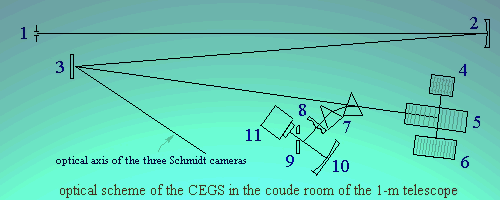

1- entrance slit; 2 - off-axis collimator; 3 - flat mirror; 4 - grating (24 deg, 600 gr/mm); 5 - echelle grating (63.5 deg, 37.5 gr/mm); 6 - echelle grating (63.5 deg, 75 gr/mm); 7 - prisms (A=45 deg); 8 - corrector; 9 - flat mirror; 10 - spherical mirror; 11 - CCD camera
Coude Echelle/Grating Spectrometer (CEGS) designed by F.A.Musaev (Sov. Astron. Lett., V.19, #8, P.776). Spectrometer and CCD camera attached to the 1 metre "Karl-Zeiss-Jena" telescope of the Special Astrophysical Observatory (a satellite of 6-m telescope) of the Russian Academy of Sciences. CEGS has been constructed for utilization at the 2-metre "Karl-Zeiss-Jena" telescope (F/36) of the Shemakha Astrophysical Observatory of the Azerbaijan Academy of Sciences. At present it is optimised when placed on the coude focal plane (F/36) of the 1-m telescope of SAO. The diameter of collimator beam is 150 mm. The camera ("folded" Schmidt) has a 350 mm focal length (crown glass) with a 45 deg apex angle. The accessible spectral range is ~3200 - ~10200 AA. The CCD camera and the data handling system, developed at SAO, consist of front-illuminated CCD device of 520x580 pixels (pixel size 18x24 mkm) inside a dewar, an electronic controller-interface and a IBM PC AT/486 computer. CEGS offers different operational modes:
Special note: At present, In the agreement with Institute Astronomy of Nicolas Copernicus University (Torun, Poland), CCD camera (Wrights Instruments Ltd.) with UV-coated 1242x1152 device (pixel size 22.5x22.5 mkm) is used with CEGS. In this case the range ~3200(+/- 100) - ~10100 (+/- 500) AA is registered simultaneously (about 100 spectral orders) with overlapping of spectral orders up to 8000 A). See example image (191K jpeg) - 1242x1152 CCD image of Solar spectrum, obtained with CEGS. About 100 spectral orders are seen.
The CEGS has been in active operation (7-10 nigths per month) at the 1-m telescope since 1993. A number of scientific programmes in the study of hot and cool stars are currently being realized. The most used mode is "high-dispersion" with a first echelle grating.
The analysis of CCD data performed on the IBM PC compatible computers (AT386+) using the image and spectra processing system DECH developed by Galazutdinov G.A. (Special Astrophysical Observatory, Preprint #92, 1992). This system permits us to realize all the steps in echelle-spectra processing - dark current and background substraction, one-dimensional spectra extraction (particularly, by using the "optimal extraction" method (K. Horne, 1986, PASP, V.98, P.609), flat-field corrections, wavelength calibration, continuum placement and rectification, line identification, equivalent widths and radial velocity measuremnts. The system operates under MS-DOS and can be used with portable computer.
![]()